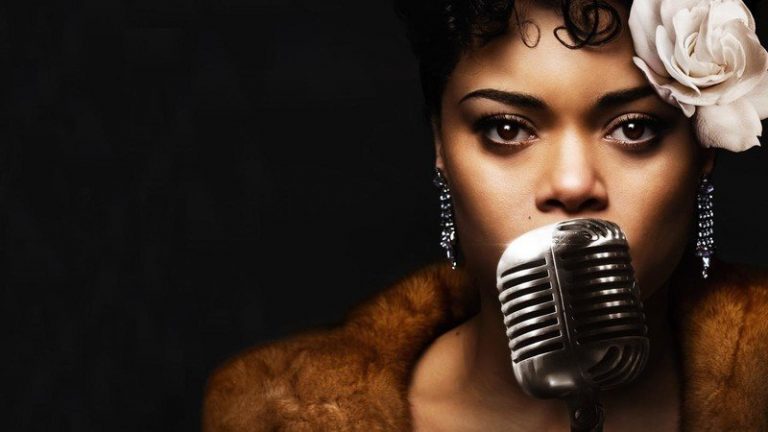
“Southern trees bear a strange fruit
Blood on the leaves and blood at the root
Black bodies swinging in the southern breeze
Strange fruit hanging from the poplar trees”
This is the first verse of the song Strange Fruit sung by Billie Holiday, that has become the true protagonist of Lee Daniel’s latest cinematic oeuvre. The “strange fruit” hereby described, is one of the many black victims hanging from trees, that would — as the song continues — be plucked by crows, battered by the rain and wind and would eventually rot in the sun and become a “strange and bitter crop.”
The film ‘The United States vs. Billie Holiday’ provides a new take on Lady Day. We see the icon of jazz in a new light. Her frailty and tormented life always rose to prominence in her biographies. But here we see her as a civil rights activist, a protest singer. Her rape at 10 years old, the violent partners she chose, are all mentioned, but they are simple background to her plight as a woman of colour, who wanted to make her voice be heard — criticising the atrocities society was inflicting on her people.
The film — based on the book Chasing the Scream: The First and Last Days of the War on Drugs by Johann Hari — will be available on Hulu and has already earned nominations for the 78th Golden Globe Awards, in the categories Best Actress in a Motion Picture Drama and Best Original Song.
This American biographical drama, shows Billie Holiday’s struggles with addiction, with abusive men, but most importantly with a government that did not want her to sing the controversial song that was the emblem of lynching. In fact, the film begins with the following words: “In 1937 a bill to finally ban lynching of African-Americans was considered by the Senate,” and continues, “It did not pass.” This horrific practice, goes all the way back to the1890s, and during the 1930s it was such a common occurrence that it rarely made news. Therefore, when the Afro-American music diva brought attention to this phenomenon with her famous song, she became a target of the government, who tried to make her the sacrificial victim of a ploy to racialise the war on drugs.
The motion picture focuses on the moment when Billie Holiday’s career and life became a target of the Federal Department of Narcotics, under the leadership of Harry Anslinger. He is the one who assigns the undercover sting operation to black Federal Agent Jimmy Fletcher, with whom Holiday will have a tumultuous affair. Within the film, Lee Daniels craftily intertwines the entourage and close friends of Billie Holiday, as well as female lovers, such as American actress Tallulah Bankhead.
Grammy-nominated singer Andra Day, stars as Billie Holiday, embracing her first role as an actress for the big screen. The American songwriter prepared with utmost dedication, and this is evident in the way her voice has been moulded to resemble the husky-drenched-with-pain hoarseness that distinguished Billie Holiday. Other notable members of the cast are Garrett Hedlund (playing the director of the Federal Bureau of Narcotics, Harry Anslinger) and Trevante Rhodes (in the role of Jimmy Fletcher). Hedlund very effectively portrays the obsessive racism of Anslinger, whereas Rhodes is very compelling in depicting Fletcher’s transformative journey from FBI agent plotting against Billie Holiday, to becoming her ally and lover.
The talented cast, Andrew Dunn’s intimate cinematography, and Jay Rabinowitz’s fine editing, coalesce under Lee Daniel’s guidance. The result is a powerful biopic, that becomes an essay about a very important page in black history. Lee Daniels, isn’t new to bringing to the silver screen stories about discriminated black people. The Butler, for instance, was loosely based on Eugene Allen, a White House butler who served eight presidents from 1952 to 1986. But these issues, that seem to pertain to bygone times, resonate strongly during our current reality. One cannot help but think that, despite decades have gone by since Strange Fruit was censored, white supremacy is still present in today’s society and is expressed with violent depreciation of the Black Lives Matter movement.
‘The United States vs. Billie Holiday’ comes across as being simultaneously a history and music class, showing how the power of the arts can denounce the wrongdoings of the past. Thus, this chronicle of lynching — expressed through Billie Holiday’s life, along with the cinematic exegesis of Strange Fruit — becomes a warning for the future.
Final Grade: B+

